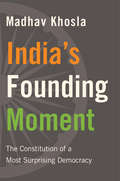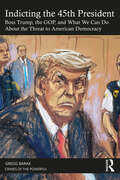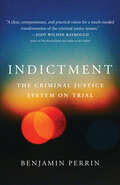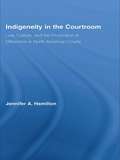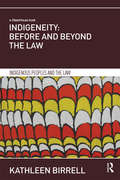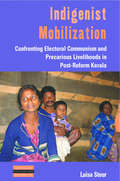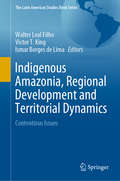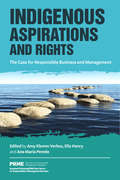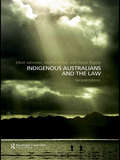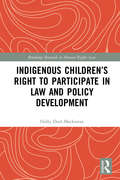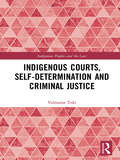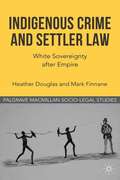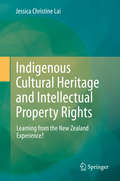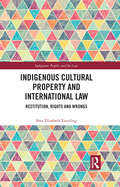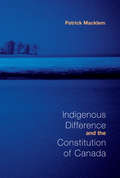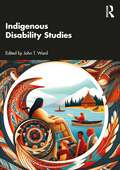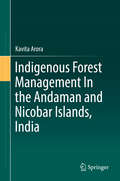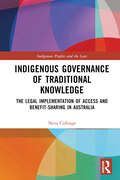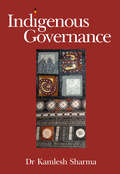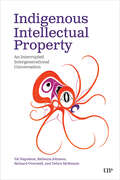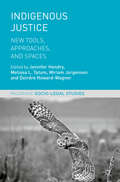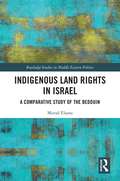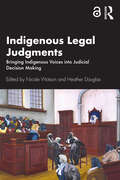- Table View
- List View
India’s Founding Moment: The Constitution of a Most Surprising Democracy
by Madhav KhoslaMadhav Khosla describes the remarkable work of the founders of independent India. All at once they built a democratic system in the midst of illiteracy and poverty enforced by a century of imperial domination and neglect. They crafted a constitution aimed at creating democratic citizens through democratic politics.
Indicted: A Thriller
by Tom SaricOne soldier thought he&’d outrun his past—until it came back to hunt him . . . A twisting international thriller by the author of Compromised. In the midst of Yugoslavia&’s bloody civil war, a young soldier witnesses something horrific. Something he was never meant to see . . . Sgt. Luka Pavic fled to the safety of Canada after entering a home to evacuate civilians before a bombing raid only to find fourteen corpses—and being falsely accused of the murders. Years later, he has succeeded in keeping his true identity a secret from everyone, even his wife and child. But when a mysterious man knocks on Luka&’s door, the world he left behind comes crashing down around him—and to save himself and his family, he must return to Croatia to unravel a conspiracy . . .
Indicting the 45th President: Boss Trump, the GOP, and What We Can Do About the Threat to American Democracy (Crimes of the Powerful)
by Gregg BarakIndicting the 45th President is a sequel to Criminology on Trump in real time, continuing the criminological investigation into the former US president. Developing and expanding on the themes of family dynamics, deviance, deception, dishonesty, and the weaponization of the law, this book offers the next chapter on the world’s most successful outlaw.In this new book, Gregg Barak considers the campaigns and policies, the corruption, the state- organized abuses of power and obstructions of justice, the pardons, the failed insurrection, the prosecutions, the indictment of Trump and the politics of punishment as these revolve around the Trumpian character and social structures that encourage such crimes of the powerful. Barak also thoroughly addresses the threat to American Democracy, critiques the current state of the U.S. constitutional system, and proposes reforms to enhance justice for all in the United States.Another accessible and compelling read, this is essential reading for all those engaged with state and white- collar crime in the context of power and privilege, and those seeking a criminological understanding of Trump’s evasion of law and justice.
Indictment: The Criminal Justice System on Trial
by Benjamin PerrinBased on first-hand interviews with survivors, people who have committed offences, and others on the frontlines, Indictment puts the Canadian criminal justice system on trial and proposes a bold new vision of transformative justice. #MeToo. Black Lives Matter. Decriminalize Drugs. No More Stolen Sisters. Stop Stranger Attacks. Do we need more cops or to defund the police? Harm reduction or treatment? Tougher sentences or prison abolition? The debate about Canada’s criminal justice system has rarely been so polarized – or so in need of fresh ideas. Indictment brings the heartrending and captivating stories of survivors and people who have committed offences to the forefront to help us understand why the criminal justice system is facing such an existential crisis. Benjamin Perrin draws on his expertise as a lawyer, former top criminal justice advisor to the prime minister, and law clerk at the Supreme Court of Canada to investigate the criminal justice system itself. Indictment critiques the system from a trauma-informed perspective, examining its treatment of victims of crime, Indigenous people and Black Canadians, people with substance use and mental health disorders, and people experiencing homelessness, poverty, and unemployment. Perrin also shares insights from others on the frontlines, including prosecutors and defence lawyers, police chiefs, Indigenous leaders, victim support workers, corrections officers, public health experts, gang outreach workers, prisoner and victims’ rights advocates, criminologists, psychologists, and leading trauma experts. Bringing forward the voices of marginalized people, along with their stories of survival and resilience, Indictment shows that a better way is possible.
Indigeneity in the Courtroom: Law, Culture, and the Production of Difference in North American Courts (Indigenous Peoples and Politics)
by Jennifer A. HamiltonThe central question of this book is when and how does indigeneity in its various iterations – cultural, social, political, economic, even genetic – matter in a legal sense? Indigeneity in the Courtroom focuses on the legal deployment of indigenous difference in US and Canadian courts in the late 20th and early 21st centuries. Through ethnographic and historical research, Hamilton traces dimensions of indigeneity through close readings of four legal cases, each of which raises important questions about law, culture, and the production of difference. She looks at the realm of law, seeking to understand how indigeneity is legally produced and to apprehend its broader political and economic implications.
Indigeneity: Before And Beyond The Law (Indigenous Peoples and the Law)
by Kathleen BirrellExamining contested notions of indigeneity, and the positioning of the Indigenous subject before and beyond the law, this book focuses upon the animation of indigeneities within textual imaginaries, both literary and juridical. Engaging the philosophy of Jacques Derrida and Walter Benjamin, as well as other continental philosophy and critical legal theory, the book uniquely addresses the troubled juxtaposition of law and justice in the context of Indigenous legal claims and literary expressions, discourses of rights and recognition, postcolonialism and resistance in settler nation states, and the mutually constitutive relation between law and literature. Ultimately, the book suggests no less than a literary revolution, and the reassertion of Indigenous Law. To date, the oppressive specificity with which Indigenous peoples have been defined in international and domestic law has not been subject to the scrutiny undertaken in this book. As an interdisciplinary engagement with a variety of scholarly approaches, this book will appeal to a broad variety of legal and humanist scholars concerned with the intersections between Indigenous peoples and law, including those engaged in critical legal studies and legal philosophy, sociolegal studies, human rights and native title law.
Indigenist Mobilization: Confronting Electoral Communism and Precarious Livelihoods in Post-Reform Kerala
by Luisa SteurIn Kerala, political activists with a background in Communism are now instead asserting political demands on the basis of indigenous identity. Why did a notion of indigenous belonging come to replace the discourse of class in subaltern struggles? Indigenist Mobilization answers this question through a detailed ethnographic study of the dynamics between the Communist party and indigenist activists, and the subtle ways in which global capitalist restructuring leads to a resonance of indigenist visions in the changing everyday working lives of subaltern groups in Kerala.
Indigenous (In)Justice: Human Rights Law and Bedouin Arabs in the Naqab/Negev
by Ahmad Amara Ismael Abu-Saad Oren YiftachelThe indigenous Bedouin Arab population in the Naqab/Negev desert in Israel has experienced a history of displacement, intense political conflict, and cultural disruption, along with recent rapid modernization, forced urbanization, and migration. This volume of essays highlights international, national, and comparative law perspectives and explores the legal and human rights dimensions of land, planning, and housing issues, as well as the economic, social, and cultural rights of indigenous peoples. Within this context, the essays examine the various dimensions of the âeoenegotiationsâe#157; between the Bedouin Arab population and the State of Israel. Indigenous (In)Justice locates the discussion of the Naqab/Negev question within the broader Israeli-Palestinian conflict and within key international debates among legal scholars and human rights advocates, including the application of the Declaration on the Rights of Indigenous Peoples, the formalization of traditional property rights, and the utility of restorative and reparative justice approaches. Leading international scholars and professionals, including the current United Nations Special Rapporteur on Violence against Women and the former United Nations Special Rapporteur on the Rights of Indigenous Peoples, are among the contributors to this volume.
Indigenous Amazonia, Regional Development and Territorial Dynamics: Contentious Issues (The Latin American Studies Book Series)
by Victor T. King Walter Leal Filho Ismar Borges de LimaThis book brings together a valuable collection of case studies and conceptual approaches that outline the present state of Amazonia in the 21st century. The many problems are described and the benefits, as well as the achievements of regional development are also discussed. The book focuses on three themes for discussion and recommendations: indigenous peoples, their home (the forest), and the way(s) to protect and sustain their natural home (biodiversity conservation). Using these three themes this volume offers a comprehensive critical review of the facts that have been the reality of Amazonia and fills a gap in the literature.The book will appeal to scholars, professors and practitioners. An outstanding group of experienced researchers and individuals with detailed knowledge of the proposed themes have produced chapters on an array of inter-related issues to demonstrate the current situation and future prospects of Amazonia. Issues investigated and debated include: territorial management; indigenous territoriality and land demarcation; ethnodevelopment; indigenous higher education and capacity building; natural resource appropriation; food security and traditional knowledge; megadevelopmental projects; indigenous acculturation; modernization of Amazonia and its regional integration; anthropogenic interventions; protected areas and conservation; political ecology; postcolonial issues, and the sustainability of Amazonia.
Indigenous Aspirations and Rights: The Case for Responsible Business and Management (The Principles for Responsible Management Education Series)
by Amy Klemm Verbos Ella Henry Ana Maria PeredoIndigenous peoples are recognised as groups with specific rights based on their historical ties to particular territories. The United Nations estimates there are 370 million Indigenous peoples, with Indigenous populations being recognised in Australia, Canada, New Zealand, the United States, the Arctic region, Central and South America, and across Asia and Africa. Indigenous Aspirations and Rights takes an Indigenous perspective in examining the intersection of business with Indigenous peoples' rights, in light of the UN Global Compact and the PRME. Indigenous rights include, but are not limited to, human, cultural, educational, employment, participatory development, economic, and social rights, rights to land and natural resources, and impacts on identity, institutions, and relations. This book illustrates three main aspects of business practices in relation to Indigenous peoples: Indigenous perspectives on failures, business and ongoing challenges to Indigenous aspirations and rights, and modelling success for Indigenous and business interests.Edited by three leading voices in Indigenous rights research and practice, Indigenous Aspirations and Rights features contributions from around the globe. The work draws together policy implications for management and implications for Indigenous peoples, and examines how the PRME, the UN Global Compact, and the concept of socially responsible business can be expanded to encompass more positive outcomes for Indigenous peoples.
Indigenous Australians and the Law
by Elliott Johnston Martin Hinton Daryle RigneyBringing together a well-respected team of commentators, many of them indigenous Australians themselves, this revised and updated edition examines the legal, social and political developments that have taken place in Australia since the publication of the last edition. Providing students with a greater understanding of the issues facing Indigenous Australians in the hope of contributing to reconciliation, the authors explore a broad range of developments, including: human rights and reconciliation in contemporary Australia; the demise of ATSIC; issues of indigenous governance and water rights. Giving readers an incisive account of the resounding impact of social, political and legal conditions upon the Indigenous people of Australia and their interaction with and recourse to the law, this book is an excellent resource for those interested in the law of a coloniser or conqueror and its lasting impact upon first nations.
Indigenous Children’s Right to Participate in Law and Policy Development (Routledge Research in Human Rights Law)
by Holly Doel-MackawayThis book presents a model for reforming and developing Indigenous related legislation and policy, not only in Australia, but also in other jurisdictions. The model provides guidance about how to seek, listen to and respond to the voices of Indigenous children and young people. The participation of Indigenous children and young people, when carried out in a culturally and age-appropriate way and based on free, prior and informed consent, is an invaluable resource capable of empowering children and young people and informing Indigenous related legislation and policy. This project contributes to the emerging field of robust, ethically sound, participatory research with Indigenous children and young people and proposes ways in which Australian and international legislators and policymakers can implement the principle of children’s participation by involving Aboriginal children and young people in the development of law and policy pertaining to their lives. This book provides accounts from Aboriginal children and young people detailing their views on how they can be involved in law and policy development in the future. It shows the latest state of knowledge on the topic and will be of interest to researchers, academics, policymakers, legislators, and students in the fields of human rights law, children’s rights, participation rights, Indigenous peoples’ law, and family, child and social welfare law.
Indigenous Courts, Self-Determination and Criminal Justice (Indigenous Peoples and the Law)
by Valmaine TokiIn New Zealand, as well as in Australia, Canada and other comparable jurisdictions, Indigenous peoples comprise a significantly disproportionate percentage of the prison population. For example, Maori, who comprise 15% of New Zealand’s population, make up 50% of its prisoners. For Maori women, the figure is 60%. These statistics have, moreover, remained more or less the same for at least the past thirty years. With New Zealand as its focus, this book explores how the fact that Indigenous peoples are more likely than any other ethnic group to be apprehended, arrested, prosecuted, convicted and incarcerated, might be alleviated. Taking seriously the rights to culture and to self-determination contained in the Treaty of Waitangi, in many comparable jurisdictions (including Australia, Canada, the United States of America), and also in the United Nations Declaration on the Rights of Indigenous Peoples, the book make the case for an Indigenous court founded on Indigenous conceptions of proper conduct, punishment, and behavior. More specifically, the book draws on contemporary notions of ‘therapeutic jurisprudence’ and ‘restorative justice’ in order to argue that such a court would offer an effective way to ameliorate the disproportionate incarceration of Indigenous peoples.
Indigenous Crime and Settler Law: White Sovereignty after Empire (Palgrave Socio-Legal Studies)
by Heather Douglas Mark FinnaneIn a break from the contemporary focus on the law's response to inter-racial crime, the authors examine the law's approach to the victimization of one Indigenous person by another. Drawing on a wealth of archival material relating to homicides in Australia, they conclude that settlers and Indigenous peoples still live in the shadow of empire.
Indigenous Cultural Heritage and Intellectual Property Rights
by Jessica Christine LaiNow more than ever, indigenous peoples' interests in their cultural heritage are in the spotlight. Yet, there is very little literature that comprehensively discusses how existing laws can and cannot be used to address indigenous peoples' interests. This book assesses how intangible aspects of indigenous cultural heritage (and the tangible objects that hold them) can be protected, within the realm of a broad range of existing legal orders, including intellectual property and related rights, consumer protection law, common law and equitable doctrines, and human rights. It does so by focusing on the New Zealand Māori. The book also looks to the future, analysing the long-awaited Wai 262 report, released in New Zealand by the Waitangi Tribunal in response to allegations that the government had failed in its duty to ensure that the Māori retain chieftainship over their tangible and intangible treasures, as required by the Treaty of Waitangi, signed between the Māori and the British Crown in 1840.
Indigenous Cultural Property and International Law: Restitution, Rights and Wrongs (Indigenous Peoples and the Law)
by Shea Elizabeth EsterlingExamining the restitution of cultural property to Indigenous Peoples in human rights law, this book offers a detailed analysis of the opportunities and constraints of international law as a tool of resistance and social transformation for marginalized groups. In accordance with an increasing insistence on respect for diverse cultures, and through their own international mobilization, Indigenous Peoples have participated in the construction of a distinct human rights framework. Significant academic inquiry has focused on the substantive gains made by Indigenous Peoples in this context; along with its impact on a body of law that had previously denied Indigenous Peoples a basis for claims to their own cultural materials and practices. Accordingly, this book acknowledges that Indigenous Peoples, as non-state actors, have generated greater substantive and procedural legitimacy in human rights law making. Offering normative insights into the participation of non-state actors in international law making, it also, however, demonstrates that, despite their significant role in constructing the legal framework of human rights in the 21st century, the participation of Indigenous Peoples continues to be structurally limited. With its interdisciplinary approach to the field, this book will appeal to scholars and students in the fields of law, politics, anthropology and indigenous studies.
Indigenous Difference and the Constitution of Canada
by Patrick MacklemThere is a unique constitutional relationship between Aboriginal people and the Canadian state - a relationship that does not exist between other Canadians and the state. It's from this central premise that Patrick Macklem builds his argument in this outstanding and significant work.Why does this special relationship exist? What does it entail in terms of Canadian constitutional order? There are, Macklem argues, four complex social facts that lie at the heart of the relationship. First, Aboriginal people belong to distinctive cultures that were and continue to be threatened by non-Aboriginal beliefs, philosophies, and ways of life. Second, prior to European contact, Aboriginal people lived in and occupied North America. Third, prior to European contact, Aboriginal people not only occupied North America; they exercised sovereign authority over persons and territory. Fourth, Aboriginal people participated in and continue to participate in a treaty process with the Crown. Together, these four social conditions are exclusive to the Aboriginal people of North America and constitute what Macklem refers to as indigenous difference.Exploring the constitutional significance of indigenous difference in light of the challenges it poses to the ideal of equal citizenship, Macklem engages an interdisciplinary methodology that treats constitutional law as an enterprise that actively distributes power, primarily in the form of rights and jurisdiction, among a variety of legal actors, including individuals, groups, institutions, and governments. On this account, constitutional law refers to an ongoing project of aspiring to distributive justice, disciplined but not determined by text, structure, or precedent. Far from threatening equality, constitutional protection of indigenous difference promotes equal and therefore just distributions of constitutional power.The book details constitutional rights to Aboriginal people that protect interests associated with culture, territory, sovereignty, and the treaty process, and explores the circumstances in which these rights can be interfered with by the Canadian state. It also examines the relation between these rights and the Canadian Charter of Rights and Feedoms, and proposes extensive reform of existing treaty processes in order to protect and promote their exercise.Macklem's book offers a challenge to traditional understandings of the constitutional status of indigenous peoples, relevant not only to Canadian debates but also to those in other parts of the world where indigenous peoples are asserting greater autonomy over their collective futures.
Indigenous Disability Studies
by John T. WardThis book provides a comprehensive approach to the perspectives, lived experiences, and socio-cultural beliefs of Indigenous scholars regarding disabilities through a distinctions-based approach. Indigenous people demonstrate considerable knowledge in a multitude of capacities in spite of legal, monetary, social, economic, health, and political inequalities that they experience within from administrative authorities whether health, education, or governments.By including various knowledge systems related to social-cultural, traditional governance, spirituality, educational, and self-representation within a communal understanding, the knowledge brought forth will be a combination of information from within/communal and outwards/infusion by Indigenous teachers, scholars, academics, and professionals who aim to combat the negative effects of disability labels and policies that have regulated Indigenous peoples.Comprised of five sections: The power, wisdom, knowledge, and lived experiences of Elders Reframing the narrative – Navigating self-representation Learning from within – Including traditional knowledge Challenging colonial authority – Infusing regional ideals and concepts Interpretations, narratives, and lived experiences of grassroots teachers and social service providers It will be an asset to those who seek out a deeper understanding of the complexity of Indigenous people and their knowledge, including anyone who deals with predominantly non-Indigenous mindsets and barriers to education.Courses on disability studies, Indigenous studies, social work, health, education, and development studies will all benefit from this book.
Indigenous Forest Management In the Andaman and Nicobar Islands, India
by Kavita AroraThis book offers an extensive study of indigenous communities in the Andaman and Nicobar Islands, India, and their methods of forest conservation, along with an exploration of the impact of forestry operations in the islands and the wide scale damage they have incurred on both the land and the people. Through an in-depth analysis of the contrasting indigenous practices and governmental forestry schemes, the author has compared the modern ‘Joint Forest Management’ resolution with the ethos and practices of the indigenous people of the Andaman and Nicobar Islands. Throughout the book, readers will learn about the different indigenous communities inhabiting these islands and the treasure of knowledge each of them provide on forest conservation. The book establishes that the notion of knowledge is politicized by the dominant culture in the context of Andaman’s forest tribes, and traces how this denial of the existence of indigenous knowledge by government officials has led to reduced forest area in the region. The book also explores and analyses strategies to utilize and conserve the tribes' profound knowledge of the biodiversity of the islands and study their efforts towards forest conservation, protection and rejuvenation.
Indigenous Governance of Traditional Knowledge: The Legal Implementation of Access and Benefit-Sharing in Australia (Indigenous Peoples and the Law)
by Neva CollingsThis book addresses the issue of Indigenous peoples' participation in genetic resource access and benefit-sharing and associated traditional knowledge for self-determination. Genetic resources from nature are increasingly used in global biodiscovery research and development, but they often use Indigenous peoples’ traditional knowledge without their consent and without sharing the benefit. The Nagoya Protocol is an instrument of the Convention on Biological Diversity intended to ensure Indigenous peoples’ traditional knowledge is used with their prior and informed consent or approval and entails benefit-sharing on mutually agreed terms. Many countries with significant Indigenous populations have signed the Nagoya Protocol and are currently grappling with implementation of its provisions. This book takes up a case study of Australia to demonstrate how Indigenous community governance in settler states can serve as a path to implementing the Nagoya Protocol. Australia’s access and benefitsharing framework is globally hailed as best practice, offering lessons for other countries implementing the Nagoya Protocol. Focusing on two Indigenous community organisations in Australia, the book establishes a unique evaluative framework for analysing and differentiating the governance arrangements used by Indigenous communities for facilitating decision-making related to traditional knowledge. This book will appeal to scholars working in the areas of international environmental law, human rights, biotechnology law, and Indigenous legal issues; as well as those directly engaged in implementing access and benefit-sharing measures and developing law reform strategies.
Indigenous Governance: Corporate Governance Concepts in the management of Indigenous Organisations
by Dr Kamlesh SharmaThis pioneering book articulates and illustrates the difference in the perceptions of corporate governance from the dominant western society and its values and the Indigenous people. It covers areas such as the cross-cultural awareness and assists in the reconciliation process between Indigenous and non-Indigenous people. Corporate governance in Indigenous organisations is an important issue that interests many different groups not only in Australia but around the world. This book about Indigenous governance and, in particular, within the Aboriginal and Torres Strait Islander organisations, reveals that the corporate governance concepts have been mainly built around western theories. This pioneering book offers guidance on Indigenous governance not only in Australia but elsewhere as well, where corporate governance practices are of increasing and immense importance. The foreword for the book has been written by Professor Mick Dodson AM, who is the Director of the National Centre for Indigenous Studies at the Australian National University in Canberra.
Indigenous Intellectual Property: An Interrupted Intergenerational Conversation
by Val Napoleon, Rebecca Johnson, Richard Overstall, and Debra McKenzieHistorically, Indigenous artistic, cultural, and societal expression has been identified and examined within Canadian or international legal regimes. This book identifies Indigenous intellectual property concerns as an Indigenous legal issue to be taken seriously within specific Indigenous legal orders. Indigenous Intellectual Property opens up complex discussions about existing Indigenous intellectual property law, and avoids the tendency to pigeonhole Indigenous intellectual property into a Western legal model. Drawing on diverse case studies, this book considers the existing laws in the Gitxsan, Secwepemc, and Hupacasath (Nuu-chah-nulth) legal orders, as well as from the Solomon Islands and Hawai’i. The case studies are grounded in their respective legal and oral histories, and contextualized within a broader discussion of Indigenous law, addressing issues of colonial myths, shrinking conceptions of Indigenous law, common resistances to Indigenous property and law, and important connections between Indigenous law and governance and citizenship. The book carefully considers how the governance and civic value of intellectual property points to the unsuitability of the current state and international intellectual property legal regimes to many Indigenous intellectual property concerns. Ultimately, Indigenous Intellectual Property reveals the various ways in which to identify and understand law within Indigenous societies – through narrative and story analysis, observations of practices and ceremonies, and political and legal ordering.
Indigenous Justice: New Tools, Approaches, And Spaces (Palgrave Socio-Legal Studies)
by Jennifer Hendry Melissa L. Tatum Miriam Jorgensen Deirdre Howard-WagnerThis highly topical collection of essays addresses contemporary issues facing Indigenous communities from a broad range of multi- and interdisciplinary perspectives. Drawing from across the social sciences and humanities, this important volume challenges the established norms, theories, and methodologies within the field, and argues for the potential of a multidimensional approach to solving problems of Indigenous justice.Stemming from an international conference on ‘Spaces of Indigenous Justice’, Indigenous Justice is richly illustrated with case studies and comprises contributions from scholars working across the fields of law, socio-legal studies, sociology, public policy, politico-legal theory, and Indigenous studies. As such, the editors of this timely and engaging volume draw upon a wide range of experience to argue for a radical shift in how we engage with Indigenous studies.
Indigenous Land Rights in Israel: A Comparative Study of the Bedouin (Routledge Studies in Middle Eastern Politics)
by Morad ElsanaIntroducing the Negev–Bedouin land issue from the international indigenous land rights perspective, this comparative study suggests options for the recognition of their land. The book demonstrates that the Bedouin land dispossession, like many indigenous peoples’, progressed through several phases that included eviction and displacement, legislation, and judicial decisions that support acts of dispossession and deny the Bedouin’s traditional land rights. Examining the Mawat legal doctrine on which the State and the Court rely on to deny Bedouin land rights, this volume introduces the relevant international law protecting indigenous land rights and shows how the limitations of this law prevent any meaningful protection of Bedouin land rights. In the second part of the work, the Aborigines’ land in Australia is introduced as an example of indigenous peoples' successful struggle for their traditional land rights. The final chapter analyzes the basic elements of judicial recognition of the land and shows that the basic elements needed for Bedouin land recognition exist in the Israeli legal system. Proposing practical recommendations for the recognition of Bedouin land, this volume is a key resource to scholars and students interested in land rights, international law, comparative studies, and the Middle East.
Indigenous Legal Judgments: Bringing Indigenous Voices into Judicial Decision Making
by Nicole Watson and Heather DouglasThis book is a collection of key legal decisions affecting Indigenous Australians, which have been re-imagined so as to be inclusive of Indigenous people’s stories, historical experience, perspectives and worldviews. In this groundbreaking work, Indigenous and non-Indigenous scholars have collaborated to rewrite 16 key decisions. Spanning from 1889 to 2017, the judgments reflect the trajectory of Indigenous people’s engagements with Australian law. The collection includes decisions that laid the foundation for the wrongful application of terra nullius and the long disavowal of native title. Contributors have also challenged narrow judicial interpretations of native title, which have denied recognition to Indigenous people who suffered the prolonged impacts of dispossession. Exciting new voices have reclaimed Australian law to deliver justice to the Stolen Generations and to families who have experienced institutional and police racism. Contributors have shown how judicial officers can use their power to challenge systemic racism and tell the stories of Indigenous people who have been dehumanised by the criminal justice system. The new judgments are characterised by intersectional perspectives which draw on postcolonial, critical race and whiteness theories. Several scholars have chosen to operate within the parameters of legal doctrine. Some have imagined new truth-telling forums, highlighting the strength and creative resistance of Indigenous people to oppression and exclusion. Others have rejected the possibility that the legal system, which has been integral to settler-colonialism, can ever deliver meaningful justice to Indigenous people.
